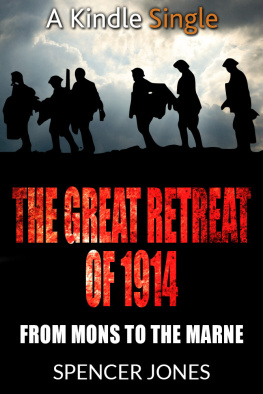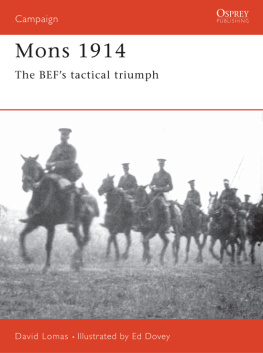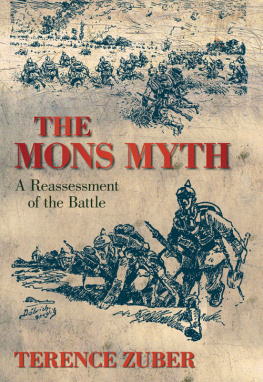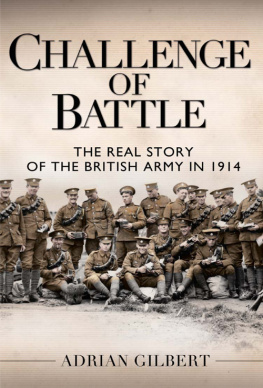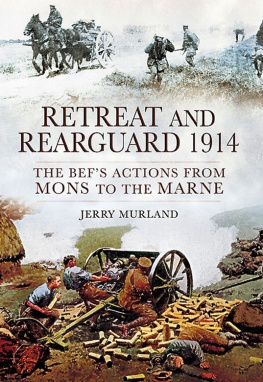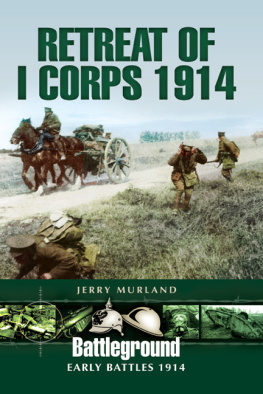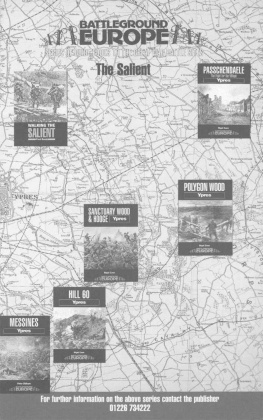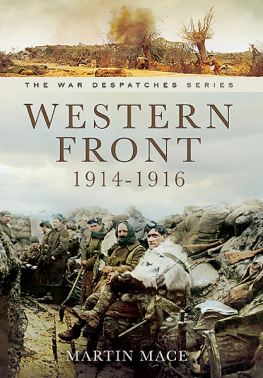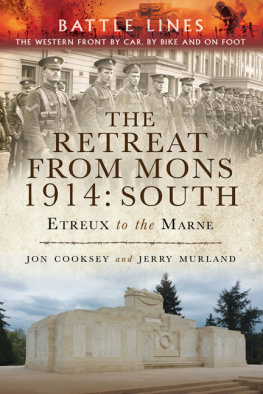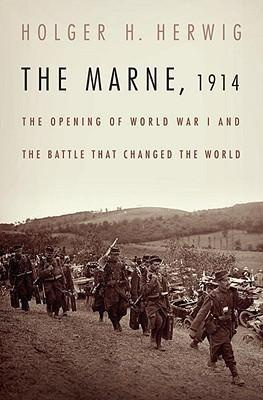The Great Retreat of 1914
From Mons to the Marne
Spencer Jones
Spencer Jones 2014
Spencer Jones has asserted his rights under the Copyright, Design and Patents Act, 1988, to be identified as the author of this work.
First published by Endeavour Press Ltd. 2014
Table of Contents
Key Figures
Britain
Field Marshal Sir John French, Commander in Chief of the British Expeditionary Force
Lieutenant-General Sir Douglas Haig, Commanding I Corps
General Sir Horace Smith-Dorrien, Commanding II Corps
France
Marshal Joseph Joffre, Commander in Chief of the French Army
General Charles Lanrezac, Commanding French Fifth Army
Germany
Chief of the German General Staff, Helmuth von Moltke
General Alexander von Kluck, Commanding German First Army
General Karl von Blow, Commanding German Second Army
A Note on Name Conventions and Unit Sizes
To avoid confusion, all references to German units and formations will be rendered in italics. British and French units will retain standard font.
In 1914, a British infantry division had a paper strength of 18,073 all ranks and 5,592 horses, supported by 76 artillery pieces (54 x 18-pounders, 18 x 4.5-inch howitzers, and four 60-pounders) and 24 machine guns.
An individual infantry brigade numbered approximately 4,000 all ranks. Each brigade consisted of four battalions of 1,000 men. Each battalion was composed of four companies of 250 men each.
The British cavalry division of 1914 had a paper strength of 9,269 all ranks and 9,815 horses, supported by 24 13-pounder guns and 24 machine guns. An individual cavalry brigade numbered approximately 1,700 all ranks.
Introduction: The Guns of August
In the swelteringly hot weeks of August 1914 the fate of Europe hung in the balance.
On 4 August, Germany hurled her forces into a carefully planned invasion of Belgium and France. The ambitious operation had first been proposed by Count Alfred von Schlieffen. Schlieffen had died in 1913 but his plan lived on.
The Schlieffen Plan was Germanys solution to the problem of a two-front war against France and Russia. Rather than split her forces and risk being defeated in detail, Germany planned to concentrate her strength in the west and land a knockout blow against France. If all went according to plan, the French would be defeated within six weeks, allowing Germany to transfer her armies to the eastern front and deal with Russia. German officers toasted to the success of the plan at the outbreak of war: Paris for lunch and St. Petersburg for dinner!
The premise of the Schlieffen Plan was simple. Germany would take a defensive stance on the Franco-German border and use the formidable fortifications in the area to hold off the anticipated French offensives. Whilst the French were battering themselves to death on the frontier, the bulk of the German army would outflank them by invading neutral Belgium and using the country as a gateway to the heartlands of France. German spearheads would race south toward Paris like the sweep of a vast scythe, encircling the city and pinning the helpless French armies against the border, where they would be cut off and annihilated.
However, invading neutral Belgium carried serious consequences. Great Britain was bound, by the terms of an 1839 treaty, to protect Belgium from any invader. Furthermore, Britain was acutely aware of the dangers of allowing a hostile power to occupy the ports of Low Countries, which could then be used as a launch pad for an invasion of British Isles.
Germany knew that an attack on Belgium would bring Britain into the war. But the war planners dismissed the idea that this would interfere with the Schlieffen Plan. The British Expeditionary Force (BEF) numbered just 120,000 men and was dwarfed by the vast manpower of Germany. Kaiser Wilhelm II is said to have described the BEF as a: contemptible little army and demanded that his men exterminate...the treacherous English.
In numerical terms the British Expeditionary Force was certainly small perhaps contemptibly so but its size belied its fighting qualities. In contrast to the mass conscript armies of the continent, the BEF was a professional army consisting entirely of volunteers. As a result the force was, man for man, the best trained army in Europe. It was led by tough and experienced officers who had learned their trade in fierce colonial warfare. On hearing of the Kaisers dismissive comments, the soldiers of the BEF began to refer to themselves as the Old Contemptibles. Their combat performance in 1914 would cement their place in history.
Within days of the BEFs deployment the full weight of the German invasion crashed into the thin British line. This book is the story of the Great Retreat that followed. Faced with overwhelming enemy numbers and battling alongside unreliable French allies, the BEF was forced to make an epic fighting withdrawal. The campaign was a battle for survival. Germany aimed to crush France in one fell swoop, whilst the Allies desperately sought time and space so that they could mount a counterattack to stem the tide.
There were moments on the Great Retreat when the fate of the BEF hung by the slenderest of threads. If the army had been wiped out then the history of Europe could have been very different. The destruction of Britains only combat ready army would have been disastrous for the Allied war effort. It would have taken Britain months to replace the men and material lost in battle. During that time, France would have been left to fend off the German invasion alone and could well have been defeated. With France out of the war, Britain would have been a helpless spectator as Germany turned her victorious armies to crush Russia. Powerless to prevent the defeat of her continental allies, Britain would have been left with no option other than to sue for peace.
The stakes were high. Fortunately, the officers and men of the Old Contemptibles were up to the task. During the vicious rearguard battles of the Great Retreat, the BEF would prove to be the grit in the engine of the mighty German war machine. Ultimately, the withdrawal was successful and led directly to the decisive Allied counterattack at the Battle of the Marne, but only after a fortnight of ferocious combat, gruelling hardship and immense courage.
Chapter 1: The British Army in 1914
The Nature of the Army
Britains official historian of the First World War, Brigadier-General James Edmonds, described the BEF of 1914 as: incomparably the best trained, best organised and best equipped British Army which ever went forth to war. Edmonds had served as a staff officer in 4th Division in 1914 and had a nostalgic affection for the pre-war army which may have coloured his views. Nevertheless, although criticised on points of detail, historians have generally agreed with Edmondss interpretation, particularly regarding the standard of training in the British Army.
The BEF was noted for its advanced tactics. The army owed much of its skill to the bitter experience of the Boer War (1899-1902). In 1899 the British government, wishing to annex the small Boer republics of South Africa to acquire their substantial gold and diamond reserves, had provoked war in anticipation of an easy victory. The conflict seemed a mismatch. The British Empire was the largest, richest and most powerful in the world. By contrast the Boers lacked a formal army and instead relied upon a citizen militia that was called together in times of emergency. But the war confounded expectations. Although they were civilians, the Boers were hardy frontiersmen. Mounted on rugged South African ponies, the Boers were crack shots and understood the terrain. They soon adopted guerrilla tactics and proved to be resilient, resourceful and exceptionally tough opponents. Sheer attrition eventually ground the Boers down, but by the end of the war in 1902 the British had suffered almost 100,000 casualties. A testament to the toughness of the Boers is the fact that Winston Churchill adopted the Boer word for their military units commando and used it as the title of Britains elite Special Forces in the Second World War.

